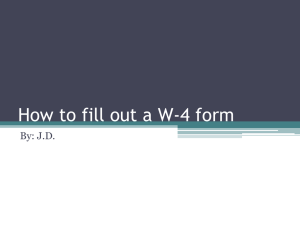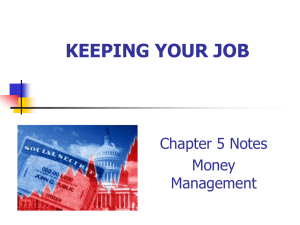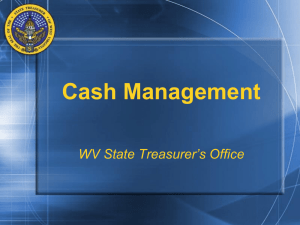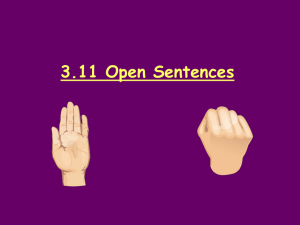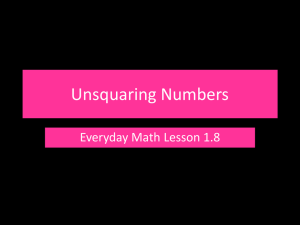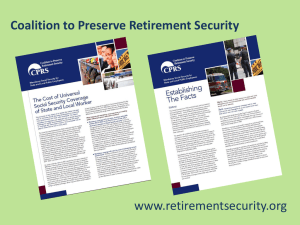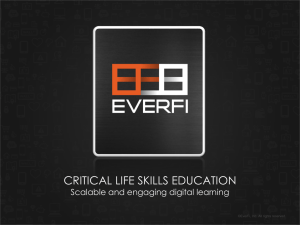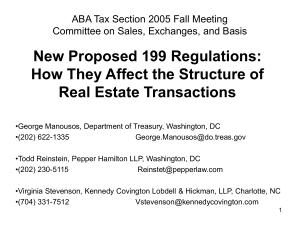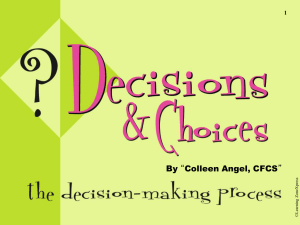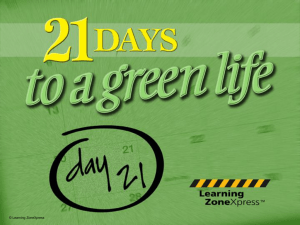Personal Finances - Louisiana Department of Education
advertisement
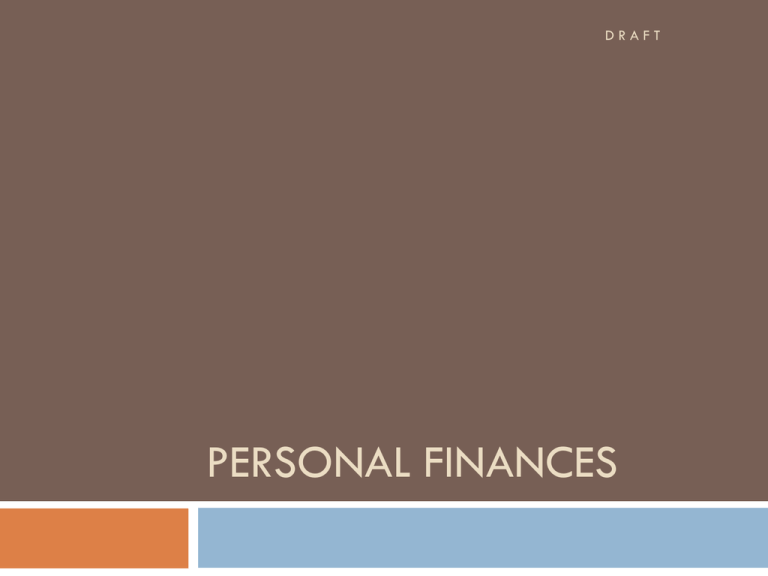
DRAFT PERSONAL FINANCES Why Study Personal Finance To help prepare for your future To help you make decisions – the decisions you make now can greatly affect the decisions you have to make in the future Choices have consequences (both positive AND negative) To have an advantage over others More & more it will be up YOU to provide for personal needs The amount that companies/government, etc. are providing for retirement & benefits is decreasing. DRAFT Financial Planning Follow it Stick with it Update it Like your resume, your financial plan is a lifelong resource that changes as you change. DRAFT Financial Plan Write down what you spend for several weeks Determine where your money goes Develop goals (short-term & long-term) Set a budget Stay on track AND out of debt DRAFT ACTIVITY: Setting Financial Goals Set a short-term goal & a long-term goal Write objectives (ways you will reach each goal) for each goal Estimate the cost Specify a date in which you want to achieve each goal Post Your Plan! Where you can see it daily Personal Portfolio DRAFT ACTIVITY: Tracking Your Spending Keep track of your spending for a week by keeping receipts in an envelope (or write amounts on the envelope) At the end of the week, list your expenses Examine your spending & write a one-paragraph summary on how your spending aligns or does not align with your financial goals/plan This information will be used to complete the Budget activity DRAFT Income Gross Pay – the amount of money paid to you before taxes & deductions are taken out Net Pay – money you actually receive after taxes & deductions Deductions Federal & State Income Tax Health Insurance Social Security & Medicare (for future benefits) Retirement Investments Other Sample Paycheck Have checks electronically deposited DRAFT Income When you receive a check, pay yourself first Immediately put a set amount in a Savings Account This will help you meet your goals Electronic deposits will assist with this YOUR financial goals are the most important expenses you have! DRAFT Income Form W-4 A form completed when starting a job so that the employer can withhold the correct income tax from your pay Employees should complete a new Form W-4 each year and/or when their personal financial situation changes How to Fill Out a W-4: http://taxes.about.com/od/preparingyourtaxes/ht/W4.htm Form W-4: http://taxes.about.com/gi/o.htm?zi=1/XJ&zTi=1&sdn=taxes&cdn =money&tm=70&gps=361_279_1419_665&f=10&su=p284.9.3 36.ip_p504.1.336.ip_&tt=7&bt=1&bts=1&zu=http%3A//www.ir s.gov/pub/irs-pdf/fw4.pdf DRAFT DRAFT Income Form W-2 Every employer engaged in a trade or business who pays remuneration for services performed by an employee must file a Form W-2 for each employee from whom income, social security or Medicare tax was withheld W-2s must be sent to the employee by January 31 of each year The W-2 received by the employee is used to file Federal Income Tax forms http://taxes.about.com/od/formw2/a/IRSFormW2.htm DRAFT Sample W-2 Form Contains your tax information for one job in one year You’ll receive one for each job you worked at during the year 12-2222222 Real World Business 16,680.24 1,728.00 16,680.24 1034.16 16,680.24 241.92 Chicago, IL 60640 000-00-000 D Irma Money 2301 South Jackson Chicago, IL 60640 IL 12-2222222 16,680.24 440.40 DRAFT 2000.00 Income Federal Taxes Helps pay for programs such as highways, law enforcement, etc. Required to file every year May get back most taxes paid Form 1040-EZ State Taxes Helps pay for programs sponsored by the state Required to file May get back taxes paid DRAFT ACTIVITY: Completing a Form W-4 Complete Form W-4. http://taxes.about.com/gi/o.htm?zi=1/XJ&zTi=1&sdn=tax es&cdn=money&tm=70&gps=361_279_1419_665&f=10 &su=p284.9.336.ip_p504.1.336.ip_&tt=7&bt=1&bts=1&z u=http%3A//www.irs.gov/pub/irs-pdf/fw4.pdf Turn in for credit. DRAFT Employee Benefits & Perks BENEFITS - Non-wage compensations provided to employees in addition to their wages or salary Insurance – health, dental, life Retirement Paid vacation Sick leave Tuition Daycare Housing Transportation/parking Disability income protection Profit sharing Others PERKS – benefits of a discretionary nature Transportation/parking Meals Other Source: http://en.wikipedia.org/wiki/Emplo yee_benefit DRAFT Personal Budget Fixed Expenses – Needs Car – loan/payment, upkeep, gas Rent or mortgage Utilities – Electricity, Gas, Water & Sewerage, Phone Insurance – car, health, rental or homeowner Food Clothing & Grooming School – loans, tuition & books Savings – short term goals & long-term goals Unexpected expenses Donations (community, charity) & Tithing Flexible Expenses - Wants Additional Clothing Dining out Social activities DRAFT Renting Monthly rental fee Utilities Electricity Gas Phone Water & Sewerage Renter’s Insurance Can be as low as $15/month DRAFT Owning A good investment Must save for a down payment Usually goes up in value May borrow against the equity built up over the years Able to deduct mortgage interest & property taxes from income taxes http://financialplan.about.com/od/realestatemortg ages/a/BuyingaHome.htm DRAFT Transportation Car Insurance Gas Maintenance Problems Bus Pay each time you ride DRAFT Insurance A way to protect things you own Car – in case of accident or injury Health – medical expenses Renter’s – for the items you own even though you are renting DRAFT ACTIVITY: Create a Budget Prepare a budget using your current financial status Turn in http://financialplan.about.com/od/moneyandcolleg estudents/l/blcollbudget.htm Use the budget calculator to develop a budget http://www.bankrate.com/calculators/smartspending/college-student-budget-calculator.aspx DRAFT Financial Institutions Bank Credit Union Federally insured – FDIC (Federal Deposit Insurance Corporation) Check policies on: Fees Balance requirements Overdraft protection Hours of business DRAFT Bank Accounts Savings Checking Write checks Use a Debit Card May be a monthly fee ATM (Automated Teller Machine) Access funds anytime ATM card required (keep your PIN safe & secretive) Must pay a fee which is automatically taken out of your account at the time of withdrawal DRAFT Saving & Investing Savings Account – earn simple or compound interest Certificates of Deposit (CDs) Money Market Account need a large amount to begin (~$500) investing more may provide a higher interest rate must leave money in CDs for a specified amount of time can write checks earns interest U.S. Savings Bonds good way to save for higher education Must be held for a specified period of time or penalties may be charged for cashing in early DRAFT Investing Save early Even a small amount invested while you are young makes a tremendous difference later in life Compounding Interest Money invested makes interest The interest then earns interest Money accumulates faster than you might think It’s better to invest a little when you are young rather than waiting to invest more when you are older DRAFT Chart Your Course Calculate saving/investing $100 per month starting at age 18 for 13 years at an 8% annual rate (compounding interest) Calculate the amount you will have at the age of 65 without investing any other additional amount. http://www.moneychimp.com/calculator/compound_interest_calculator.htm DRAFT Investing Stocks – ownership in a company Bonds – loan money Mutual Funds – money is invested in various ways There is some risk but may make more money (reward) The higher the reward, the higher the risk DRAFT Investing & Money Making Ideas http://teenmoneycentral.com/2009/07/15/investin g-for-teens/ http://teenmoneycentral.com/2009/07/15/waysfor-kids-to-make-money/ DRAFT ACTIVITY: Committing to Saving Make a commitment to invest a portion of your income each month, not matter how little or how much. Write the commitment down. Post it where you can see it every day. Include it in your personal portfolio. DRAFT Loans Interest is charged If you pay more than the required monthly payment, you will pay the loan off early AND pay less interest DRAFT Credit Cards Use for emergencies only Will help you establish credit Check the interest rate & yearly fee Pay the full amount owed EVERY month Stay away from spending up to your credit limit Do not skip payments or make late payments – you will be charged extra fees You will pay interest on what you owe AND interest on the interest you previously paid DRAFT Receipts Keep all receipts Use checking account, savings account & Debit Card receipts to balance account Use credit card receipts to check monthly statements Using receipts & checking/balancing accounts helps prevent theft or errors made by the institution Identity Theft – Example: Sears credit card; over $800 charged on the card over the Internet; checking the receipts against the statement identified this problem; the credit card owner was not held liable Can cause a person’s credit to be ruined DRAFT Credit Score Everyone has one The higher the score, the better your rating The better the score, the easier it is to borrow money at a lower rate if/when necessary House Car 3 Major Credit Bureaus Equifax Trans Union Experian DRAFT Debt Limit your debt Purchase needs Save for wants Have a plan Avoid late fees, high interest rates DRAFT Retirement Start saving early 401(k) plan Invest a portion of your income Sometimes companies match your contribution IRA (Individual Retirement Account) Regular – you do not pay taxes until retirement Roth – pay taxes while contributing to it DRAFT EVERFI: Online Financial Literacy Program www.everfi.net 10 modules (introduction & 9 lessons) Obtain your Site Code Register Create Class Code(s) & description of the code Examples: 2nd Hour EFC, 5th Hour EFC Students will use code when they register (they MUST use the correct code) Student logins REQUIRE them to use their school login (User ID & Password) DRAFT EVERFI: Online Financial Literacy Program Grading: 10 points for each module = 90 total points Must make a 70 or above to be certified Can give them points for completing the introductory lesson Set class goal Provide incentives Print & post certificates 100% Percenters: Signs for each module Students write name on cutout & post under sign when score 100% by due date DRAFT Student Resources Web sites: http://personalfinancetipsforyoungpeople.com/ http://www.mlive.com/business/annarbor/index.ssf/2009/04/josh_levine_six_principle s_of.html Banks & Credit Unions Parents Realtors Finance Planners DRAFT Sources http://taxes.about.com/od/preparingyourtaxes/ht/W4.htm http://www.irs.gov/pub/irs-pdf/iw2w3.pdf http://taxes.about.com/od/formw2/a/IRSFormW2.htm www.kellyhs.org/.../Hicks/Information%20Technology/documents//Sample_W2_Form%5B2% http://EzineArticles.com/?expert=Cynthia_B._Carlton http://EzineArticles.com/2614052 http://taxes.about.com/od/1040ez/Form_1040_EZ_Instructions.htm http://financialplan.about.com/od/realestatemortgages/a/BuyingaHome.htm http://financialplan.about.com/od/moneyandcollegestudents/l/blcollbudget.htm http://www.bankrate.com/calculators/smart-spending/college-student-budgetcalculator.aspx http://www.moneychimp.com/calculator/compound_interest_calculator.htm GoVenture Education IdeaBook. www.goventure.net DRAFT Teacher Resources Request free materials from to access resources such as the “What Do You Think?” activities & steps to financial planning NEFE High School Financial Planning Program. Greenwood Village, SC: National Endowment for Financial Education, 2006. Free Hsfpp.nefe.org Click on Instructors DRAFT Additional Teacher Resources InVEST – tools for personal finance & insurance; fun, interactive lessons for students Teacher & Student Workbooks Lesson plans Games Rating software Guest speakers Etc. www.investprogram.org DRAFT Additional Teacher Resources Financial Literacy: Spend, Save and Track Your Money. Learning ZoneXpress (www.learningzoneexpress.com) Financial Literacy: Manage and Multiply Your Money. Learning ZoneXpress (www.learningzoneexpress.com) DRAFT
